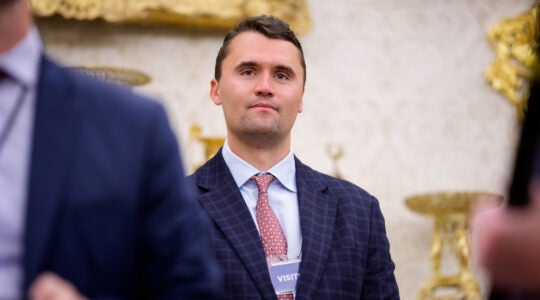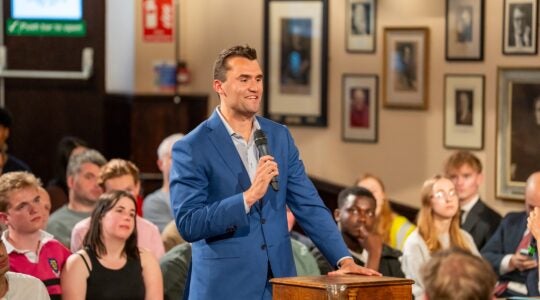(JTA) — Comments by the head of a Texas school association at the center of a controversy over Sabbath accommodations is fueling a drive by its members to be more open to the needs of Jewish and Muslim schools.
Edd Burleson, the director of the The Texas Association of Private and Parochial Schools, revived the controversy over the Robert M. Beren Academy of Houston’s participation in the state boys’ basketball tournament last month when he told the Dallas Morning News in an interview published Sunday that the predominantly Christian association “shouldn’t have accepted (Beren) in the first place.”
The Houston Chronicle reported that the TAPPS board could decide next month whether to penalize the Beren Academy for a rules violation for failing to withdraw from the tournament last month. Beren had requested a time change for the 2A tournament’s semifinals and finals, which were scheduled for a Friday night and Saturday afternoon, to accommodate Sabbath observance. TAPPS agreed to do so only after several players and their parents filed a lawsuit.
It wasn’t the first religious controversy for TAPPS. In 2010, its board denied membership to a Muslim school after asking the Iman Academy Southwest to complete an application with questions about Islam, The New York Times reported.
In an interview with JTA, Burleson defended both the comments about Beren Academy and the decision by TAPPS to exclude the Muslim school. Burleson said TAPPS was upholding its rules, not engaging in religious discrimination.
But now TAPPS member schools are pushing the association to become more accommodating. Some, including the Texas Catholic Conference, which represents the state’s Catholic schools, are threatening to withdraw if their concerns are not resolved.
“As an organization of private and parochial schools, we should be open to everyone, allow all students to participate and be sensitive to their needs,” said Jeffery Patterson, executive director of the Texas Catholic Conference, which asked TAPPS to let the member schools review TAPPS’ operations. “If this doesn’t get resolved appropriately, certainly it will bring into question whether Catholic schools will continue our affiliation with TAPPS.”
Rabbi Harry Sinoff, head of school at Beren Academy, declined to comment on Burleson’s remarks but said the school would like to remain in TAPPS.
“They’re at a crossroads now, reflecting on what their mission should be,” Sinoff said. “A broad mission of inclusiveness, bringing together lots of different schools and making accommodations that would be reasonable, or do they want to be a more homogeneous, narrowly focused organization? … We hope they go for inclusiveness so we can be part of it.”
Sinoff said he did not know the details of the cases involving the Muslim school but that he would like to see all the schools included in TAPPS — Jewish, Muslim, Christian or others. “There should be objective criteria for admission, and all schools who meet that criteria should be admitted without reference to religion or race,” he said.
TAPPS, which was created in 1978, has approximately 220 member schools, nearly all Christian, that compete in athletic and arts competitions.
Burleson maintains that he does not object to a Jewish school, but said that when Beren Academy joined the league three years ago, school officials said they understood that it would not be able to participate in the playoffs.
“Three years later there was a lot of controversy, a lot of hard feelings, a lot of changes that had to be made to accommodate the school that told us up front they would not request these accommodations,” Burleson said.
Nathan Lewin, a prominent Washington attorney who represented the Beren parents and players, said Burleson’s comments confirmed that “he has a very jaundiced, and I can only say bigoted, view about people other than his own kind.”
Lewin compared Beren’s agreeing not to dispute the schedule to a civil rights case regarding an unconstitutional property deed barring a sale to a black person.
“You can’t be barred from exercising your constitutional right because somebody has had a biased and illegal provision in their bylaws and contract when you’ve come in,” Lewin said. (While the school asked TAPPS for an accommodation, it was parents and the players, not the school, who filed suit.)
The denial of membership to Iman Academy Southwest, The New York Times reported, came after the school was asked to submit an application that asked such questions as, “Does the Koran actually state that the Bible is polluted?” The Times reported that at least two other Islamic schools were given similar questionnaires but declined to complete them.
Cindy Steffens, principal of the Iman Academy, said she did not believe TAPPS had any intention of accepting the school. Steffens cited the offensive questionnaire, with questions like “What do you think about the spread of Islam in America?”
She said that when Iman Academy officials appeared before the TAPPS board, the board brought up the Sept. 11, 2001 terrorist attacks as the “elephant in the room.” TAPPS never officially notified the academy that it had been rejected for membership.
“It was very hard for me to swallow,” Steffens said.
Steffens said she did not speak to anyone about the incident until recently, when The New York Times contacted her, because the school did not want negative attention.
“Our intention was to lie low and hope for the changing of the guard of TAPPS, so at some point maybe they’d be more inclusive so Iman Academy could come in,” she said.
Steffens said she was upset when she heard about Beren’s experience. “To have this happen to a Jewish school, that hurt me. They’re doing it again,” she said.
Burleson said the board denied Iman Academy’s application because the school had no experience in athletic competition.
But he said that TAPPS has never made an effort to determine whether its members want the organization to include schools of all faiths. It is now doing so, holding two member meetings and distributing a survey asking schools if they want the association to be all inclusive and whether they are willing to make accommodations.
The New York Times reported that TAPPS surveyed members in 2010 about whether to include Muslim schools. Of the 83 schools that responded, 63 percent said it was not in TAPPS’ best interest, the paper reported.
“Over the 20 years I’ve been associated with TAPPS, there’s been no direction from our membership to be all inclusive,” Burleson told JTA.
Bill McGee, the headmaster of Hill Country Christian School in Austin, which faced Beren in the playoffs and moved its game time to accommodate the Beren community’s Shabbat observance, spoke at a March 27 TAPPS meeting in favor of inclusivity.
He said the United States was built on religious tolerance and that his school had no problem accommodating the religious beliefs of Beren students.
“The general membership desires to be inclusive, and that seems to be at odds with the leadership of the organization,” McGee told JTA. “An organization which is primarily athletic or competitive in nature, there’s no reason for those organizations to be exclusive.”
Larry Taylor, head of TAPPS member school Prestonwood Christian Academy in Plano, believes the association would be strengthened by the involvement of all non-public schools.
“The sheer number strengthens the quality of our competition,” Taylor said. And, he added, “The diversity provides an experience for our students that’s very important for their preparation for college and for life.”
To some members, inclusion is a religious obligation. Connie Wootton, executive director of the Southwestern Association of Episcopal Schools, said a major tenet of an Episcopal education is racial, ethnic, economic and religious diversity.
“If we expect others to respect our beliefs, we have to respect theirs, too,” she said. “That’s the Christian model.”
Martin Cominsky, regional director for the Anti-Defamation League’s Southwest Region, said his agency was disappointed by TAPPS’ attitude toward Muslim and Jewish schools.
“I believe TAPPS should use universal admissions criteria that are not discriminatory against any particular religion,” Cominsky said. “Those politics ought to reflect the ever-increasing diversity in the state of Texas.”
JTA has documented Jewish history in real-time for over a century. Keep our journalism strong by joining us in supporting independent, award-winning reporting.





